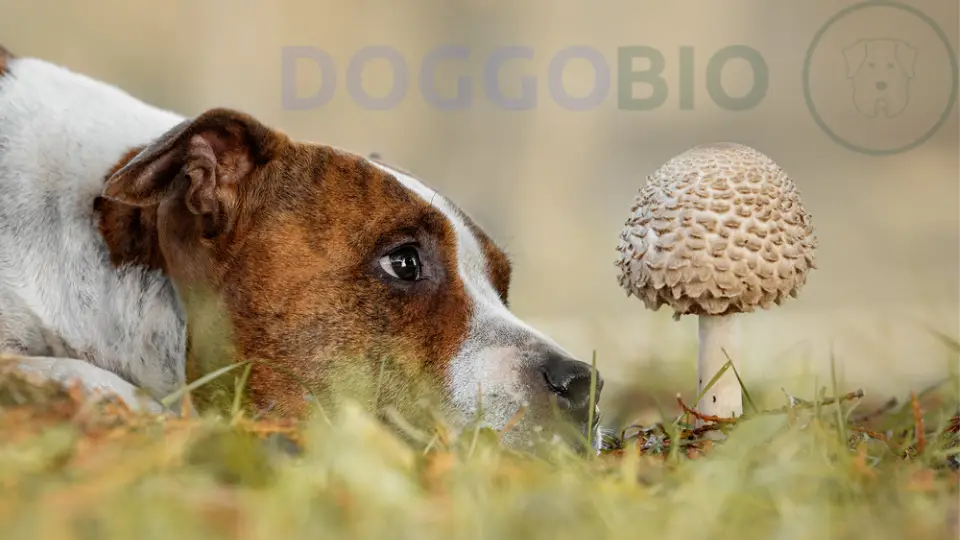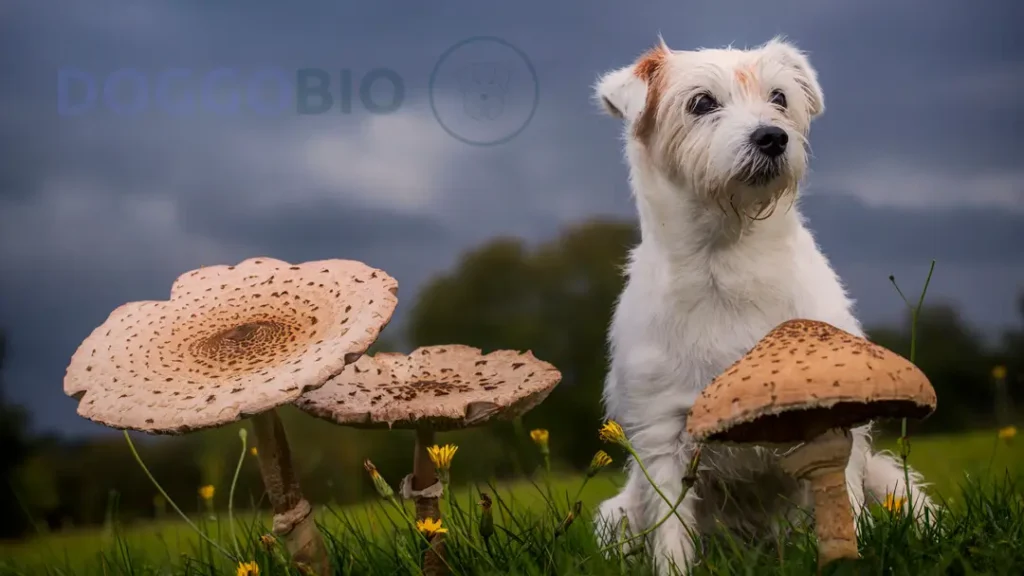As pet owners, we are always cautious about what foods we can safely share with our furry friends. One common question that arises is: “Can Dogs Eat Mushrooms?” This topic garners considerable attention as mushrooms are a common ingredient in many human dishes, yet their effects on dogs can differ. The short answer to this query is both yes and no. While some mushrooms are perfectly safe for dogs, others can be highly toxic.
This article will explore the types of mushrooms that are safe for dogs, those that should be avoided, and the signs to watch for if your dog consumes a potentially dangerous mushroom. Understanding these distinctions is crucial for ensuring the health and safety of your beloved canine companion.
Can Dogs Eat Mushrooms?
Yes, dogs can eat certain mushrooms, but not all are safe. Store-bought varieties like white button, cremini, and portabella are generally safe if organic, unseasoned, and cooked.
However, wild mushrooms can be extremely dangerous, with some types like Amanita phalloides (death cap) being toxic and potentially fatal. Symptoms of mushroom poisoning in dogs vary from gastrointestinal upset to severe reactions like seizures.
It’s crucial to consult a veterinarian before introducing mushrooms into your dog’s diet and to ensure they never consume wild mushrooms.
Types of Mushrooms That Are Safe for Dogs
Not all mushrooms are created equal; the same goes for those safe for dogs. Some types of mushrooms are safe and beneficial for our canine companions. These include:

1. Button Mushrooms
Button mushrooms, also known as white mushrooms, are one of humans’ most commonly consumed mushrooms. They are low in calories and rich in nutrients such as potassium, selenium, and vitamin B. These mushrooms are also safe for dogs if cooked and served in moderation.
Benefits of Button Mushrooms for Dogs
- They are low in calories, making them a suitable treat for overweight dogs.
- Rich in antioxidants, which can help boost the immune system.
- It contains essential vitamins and minerals that contribute to overall health.
Precautions When Feeding Button Mushrooms to Dogs
- Always cook button mushrooms before giving them to your dog, as raw mushrooms can be difficult for dogs to digest.
- Serve in moderation, as too much can cause stomach upset and diarrhea.
- Avoid feeding button mushrooms to dogs with kidney problems, as they are high in purines, which can worsen the condition.
2. Shiitake Mushrooms
Shiitake mushrooms are a popular ingredient in Asian cuisine known for their meaty texture and earthy flavor. They are also packed with nutrients such as B vitamins, copper, and selenium. These mushrooms are safe for dogs, but only when cooked and served in small amounts.
Benefits of Shiitake Mushrooms for Dogs
- Rich in antioxidants, it can help fight free radicals and boost the immune system.
- It contains beta-glucans, which have anti-inflammatory properties and can benefit dogs with arthritis or other inflammatory conditions.
- High fiber can aid digestion and promote a healthy gut.
Precautions When Feeding Shiitake Mushrooms to Dogs
- Always cook shiitake mushrooms before giving them to your dog, as raw mushrooms can be difficult for dogs to digest.
- Serve in moderation, as too much can cause stomach upset and diarrhea.
- Avoid feeding shiitake mushrooms to dogs with autoimmune diseases, as they can stimulate the immune system and worsen the condition.
Types of Mushrooms That Are Toxic for Dogs
While some types of mushrooms are safe for dogs, others can be highly toxic and even fatal. It is essential to know which mushrooms to avoid and what to do if your dog accidentally consumes them.

1. Wild Mushrooms
Wild mushrooms are any type that grows in the wild and is not cultivated for consumption. These mushrooms can be highly toxic to dogs, and it is best to avoid them altogether. Some common types of wild mushrooms that are toxic to dogs include:
Amanita Muscaria (Fly Agaric)
This mushroom contains ibotenic acid and muscimol, which can cause severe neurological symptoms in dogs, such as hallucinations, seizures, and coma.
Amanita Phalloides (Death Cap)
This mushroom contains amatoxins, which can cause liver and kidney failure in dogs. Symptoms may not appear for several days, making it difficult to treat.
Gyromitra Esculenta (False Morel)
This mushroom contains gyromitrin, which can cause severe gastrointestinal symptoms, seizures, and even death in dogs.
2. Store-Bought Mushrooms
While store-bought mushrooms are generally safe for human consumption, they can be harmful to dogs if consumed in large quantities or regularly. This is because they may contain preservatives, pesticides, or other chemicals that can be toxic to dogs.
Symptoms of Mushroom Poisoning in Dogs
- Vomiting
- Diarrhea
- Abdominal pain
- Lethargy
- Weakness
- Loss of coordination
- Seizures
- Coma
If you suspect your dog has ingested toxic mushrooms, seek immediate veterinary care.
Precautions When Feeding Mushrooms to Dogs
Before giving your dog any mushroom, taking the necessary precautions to ensure their safety is essential.

1. Always Cook Mushrooms Before Feeding Them to Your Dog
Raw mushrooms can be difficult for dogs to digest and may cause gastrointestinal upset. Cooking mushrooms can also help break down some compounds that may harm dogs.
2. Serve Mushrooms in Moderation.
While some mushrooms are safe for dogs, it is crucial to serve them in moderation. Too much of any food can cause stomach upset and potentially lead to more severe health issues.
3. Avoid Feeding Wild Mushrooms to Dogs
As mentioned earlier, wild mushrooms can be highly toxic to dogs, and it is best to avoid them altogether. It is best to keep your dog away from them if you are still determining the type of mushroom growing in your yard or on your walks.
Some Posts You Wanna Read More
- Can Dogs Eat Potato Salad?
- Can Dogs Eat Cabbage?
- Can Dogs Eat Cilantro?
- Can Dogs Eat Coleslaw?
- Can Dogs Eat Egg Salad?
- Can Dogs Eat Horseradish?
- Can Dogs Eat Jicama?
- Can Dogs Eat Lima Beans?
- Can Dogs Eat Okra?
Frequently Asked Question
1. Can dogs eat canned mushrooms?
No, canned mushrooms are not recommended for dogs, as they may contain preservatives or other additives that can be harmful to them.
2. Are all types of wild mushrooms toxic to dogs?
Not all wild mushrooms are toxic to dogs, but it is best to avoid them altogether to be safe.
3. Can dogs eat cooked mushrooms?
Yes, cooked mushrooms are generally safe for dogs to eat in moderation.
4. Are there any health benefits of feeding mushrooms to dogs?
Some types of mushrooms, such as button and shiitake, can provide health benefits for dogs, including boosting the immune system and promoting a healthy gut.
5. What should I do if my dog accidentally eats a toxic mushroom?
If you suspect your dog has ingested a toxic mushroom, seek immediate veterinary care. Time is of the essence when it comes to treating mushroom poisoning in dogs.
Conclusion
In conclusion, the question of “Can Dogs Eat Mushrooms?” is not one with a simple yes or no answer. While certain types of mushrooms are safe and can even be nutritious for dogs, others pose serious health risks. Dog owners must be able to distinguish between secure and harmful varieties and, when in doubt, err on the side of caution and avoid feeding mushrooms to their pets.
Always consult a veterinarian before introducing new foods into your dog’s diet. Remember, the safety and well-being of your furry friend should always be the top priority. Being informed and cautious can help ensure your dog enjoys a healthy and happy life.
